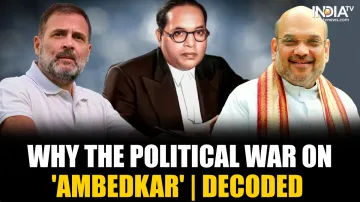BJP, Congress engage in all-out war over Ambedkar issue, why Babasaheb matters in politics | EXPLAINED
Ambedkar row: An unprecedented political war between the government and Congress-led Opposition is underway over the legacy of Ambedkar. Both warring sides are trading allegations of insulting the stalwart. But, the reality is that it is the vote bank politics which is at play behind the picture.

Ambedkar row: The Parliament turned into a battleground on Thursday as protests led by the ruling Bharatiya Janata Party (BJP) MPs and leaders of the INDIA bloc, including Congress leaders Mallikarjun Kharge and Rahul Gandhi intensified over over the Ambedkar row. The agitations took an ugly turn after MPs from both protesting sides clashed on the premises of the Parliament in which BJP MPs Pratap Chandra Sarangi and Mukesh Rajput suffered injuries. On the other side, Congress alleged that party chief Mallikarjun Kharge was manhandled.
Protests against Amit Shah
All the political slugfest started with Home Minister Amit Shah's statement on BR Ambedkar in the Rajya Sabha during a debate on the Constitution. The Opposition sought action against Shah for his remarks which they claimed were an insult to Ambedkar. MPs of the Congress, DMK, RJD, the Left, AAP, among others, participated in the protest.
Congress distorted my statement: Amit Shah
Hitting back at the Opposition, Shah on Wednesday accused the Congress of twisting facts and distorting his comments on Ambedkar in the Rajya Sabha, asserting that it launched the malicious campaign after the discussion on the Constitution "established" the opposition party as being "anti-Ambedkar and anti-reservation". The party, he added, has adopted the tactic of misrepresenting and distorting statements, including those of Prime Minister Narendra Modi, and then creating an uproar to mislead people. He said he comes from a party and an ideology that can never insult the architect of the Constitution and his ideas, not "even in dreams".
Why Ambedkar matters
Babasaheb Ambedkar is no less than a God for his followers (Ambedkarwadis). On several occasions, violence erupted whenever his statue was damaged or insulted. A recent example is a violent protest which took place in Maharashtra's Parbhani on December 12. Ambedkar holds a two-dimensional influences on Indian society. One is political influence and another is social. Experts credited Ambedkar for the social justice movement in India which empowered backward and suppressed classes in the country. The BJP and the Congress, who are in the race to represent themselves as the biggest follower of Ambedkar, do not have a very good track record when it comes to implementing Ambedkarism. However, in India perception does matter so every party projects itself to be an ardent supporter of Ambedkar to woo voters. There would be hardly a state in India where vote bank politics is not played in the name of Ambedkar. The father of the Indian Constitution is a key feature in the Hindi heartland and Dravidian states. Politics on Ambedkar revolves around Dalit and OBC issues.
How Ambedkar turned into a political agenda
During and post 'Mandal' politics - referred to the implementation of the recommendations of the Mandal Commission to give 27 per cent reservation to OBCs in government jobs and public universities - Ambedkar became a synonym of reservation and social justice politics. Parties broken away from Janata Dal and Kanshi Ram-led Bahujan Samaj Party (BSP) made Ambedkar their ideal and political icon. The BJP, during the 90s, was considered anti-Ambedkarism as they carried a parallel initiative - Mandal politics (referred to the Hindutva politics) in the early 90s. However, during the Modi era, the BJP with pro-poor policies, started projecting itself as a supporter of Ambedkar.
Decline of BSP, other regional parties give window to Congress, BJP
In the last couple of years, those whose politics were around Ambedkar's idealogy have been losing their electoral ground and the national parties - the Congress and the BJP want to fill that vacuum. Mayawati-led BSP is in declining mode. After the death of Ram Vilas Paswan and Mayawati's poor shows in elections, there is a space for newcomers to lead Dalit politics in the country. However, Lok Janshakti Party's Chirag Paswan, Republican Party of India (A)'s Ramdas Athawale, Ambedkar's grandson Prakash Ambedkar with his Vanchit Bahujan Aghadi (VBA) are working to strengthen Ambedkar's ideology in their respective states.
Vote bank and Ambedkar's legacy
Since Ambedkar is the biggest Dalit or backward class icon, no politician wants to stand out of line. Here is the reason why politicians recite 'Jai Bhim'. Some seats are reserved in Lok Sabha and assemblies for the members of the Schedule Castes and Scheduled Tribes. As per the order issued by the Delimitation Commission in 2008, 84 seats are reserved for Scheduled Castes and 47 seats for the Scheduled Tribes in the Lok Sabha. According to Pew Research, the 2011 census reported that 17 per cent of the population are members of Scheduled Castes (SC) and 9 per cent as members of Scheduled Tribes (ST). In addition, 3,743 castes and communities as OBCs which was estimated 52 per cent of the total population as per the 2011 census. The OBC factor emerged as decisive in the elections in the last couple of decades.
Also read: Ambedkar row: Mallikarjun Kharge submits privilege notice in Parliament against Amit Shah